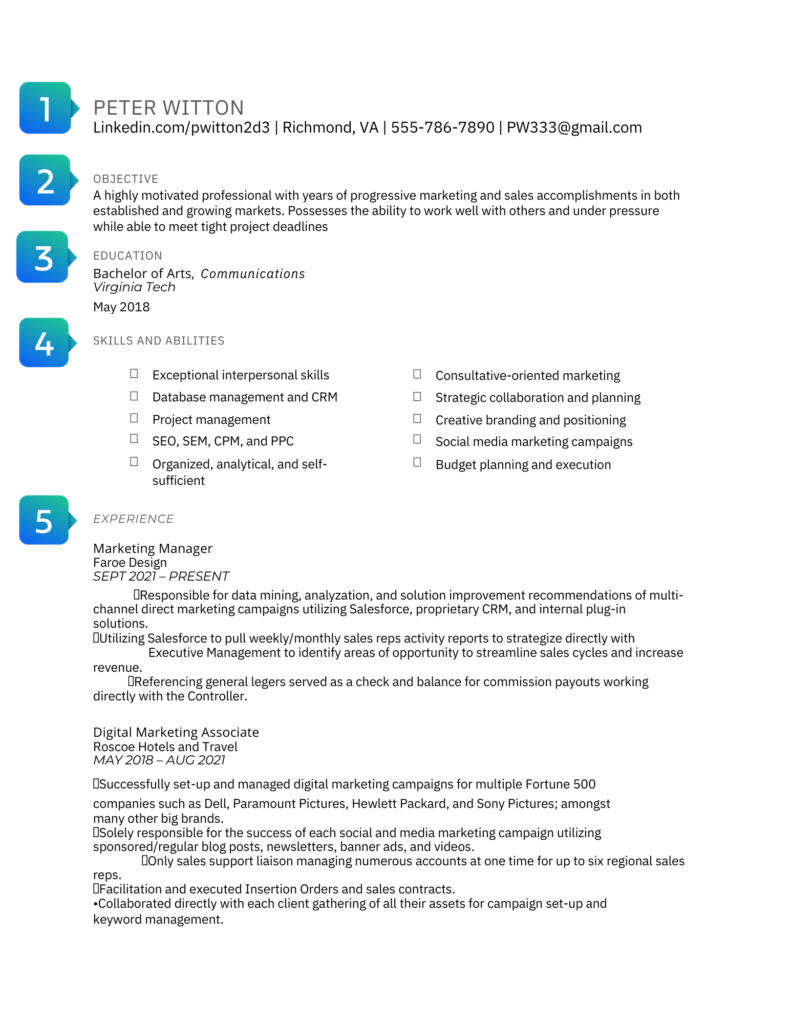When you’re looking for a job, your resume is your ticket to land an interview with a hiring manager. It allows managers and recruiters to see, at a glance, whether you have the necessary qualifications for a position.
When you’re just getting started in your career, your resume helps you market yourself to employers and show how your academic studies or early jobs have prepared you to succeed in a position.
What to focus on in an early career resume
Summarizing your strengths
Since you don’t have a lot of work experience for a hiring manager to go on, you have to help them understand who you are in other ways. An early career resume does this quickly, summarizing your academic and extracurricular experience in a way that positions you as a strong candidate for the job you want.
Relevant qualifications
Though you may not have a long list of previous full-time jobs, you’ve picked up skills in other areas, like from part-time work and leadership positions you’ve held. Your early career resume lists these skills and other relevant qualifications, like coursework and certifications, that would make you a good hire.
Why do you need a early career resume?
An early career resume can help you land your first job out of high school or college, showing hiring managers how your education has prepared you for the workforce.
It’s also necessary to advance your career. If you’re ready to move up from an entry-level job, a resume can help you position yourself as an asset to prospective employers so you can earn more money and take on additional responsibilities.
When should you use an early career resume?
You can use an early career resume when:
- You’ve recently graduated college
- You’re entering the workforce for the first time
- You have 1-3 years of work experience
Common challenges and how to overcome them
Showing experience when you haven’t had many jobs
Lacking experience doesn’t have to inhibit your career prospects. The key is selling your skills rather than your prior jobs. Use your resume to emphasize skills you’ve gained from classes, extracurricular activities, clubs and organizations, volunteer work, internships and unofficial or part-time jobs. See the resume section below for an example of how to use non-work experience in a way that showcases your skills.
Not having an impressive academic career
Sure, it’s easy to highlight your achievements if you were an honor roll student… but what if your academic career isn’t so glowing? The good news is, most employers don’t dig deeper into your academic history than confirming you have the actual degree you say you have. So, if your GPA is on the low end of the scale and you barely squeaked out passing scores on your final exams, choose other, stronger areas of experience to emphasize.
Early career resume format and key components
If you don’t have a long list of prior jobs to fit on your resume, a simple or chronological format would be a good choice.
Here are the key components to include:
- Contact information
At the top of your resume, include your name, address, phone number and email address. Be sure to use a professional sounding email address from a reputable email provider, and use your home/permanent address. - Objective statement
An objective statement is a one- to two-sentence blurb at the top of your resume that describes you as a candidate and/or the type of position you’re looking for. You may or may not choose to include an objective statement, but many new grads without a lot of job experience find it useful to give hiring managers a little more context. - Education
If you’re looking for your first job after school, you should list education as one of the first sections on your resume. This calls attention to the fact that you’re a new grad, which is helpful information for hiring managers. List your school, the degree you obtained (or will obtain), and the date of completion.
- Skills and qualifications
This is the place to call out qualifications that are relevant to the job you’re applying for. Usually a bulleted list works best. You can either name skills directly (i.e. Microsoft Excel, UI design, project management) or use short phrases (i.e. four years experience operating specialized forestry equipment). - Experience
Your experience section should include all of the jobs you’ve held, including part-time and summer jobs, as well as non-work positions in which you’ve gained relevant experience. For non-work positions, be sure to highlight leadership roles and noteworthy accomplishments.
The experience section of a young job seeker’s resume might look like this:
Food Science Intern, The Coca Cola Company. Atlanta, Georgia. May – August 2021
- Conducted research and analyzed data to increase the company’s understanding of its products
- Prepared samples, coordinated lab equipment, and took accurate measurements during sensory testing
- Led “intern only” meetings to establish weekly priorities and track progress of intern group
Vice President, Phi Beta Kappa. University of Georgia. September 2020 – May 2021
- Served as the chapter’s primary student representative at college and public events while maintaining 4.0 GPA
- Created a nomination program to identify high achievers on campus and grow society membership
- Coordinated member-alumni events and organized bi-monthly digital newsletter
Don’t feel like you need to fill up every inch of the page on your first resume. Adequate white space makes your resume easy to scan and helps keep the reader’s focus on accomplishments that strengthen your candidacy.
Need help crafting a resume?
Choose a template and build your perfect resume today!
